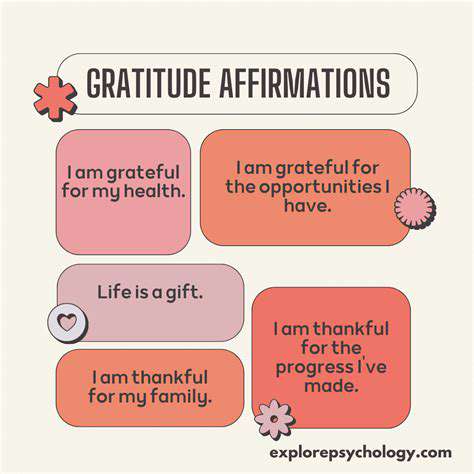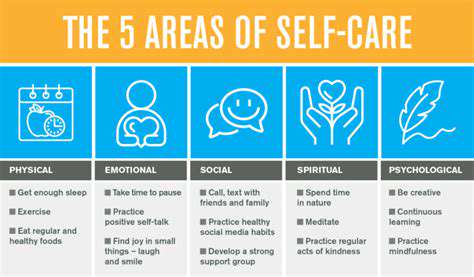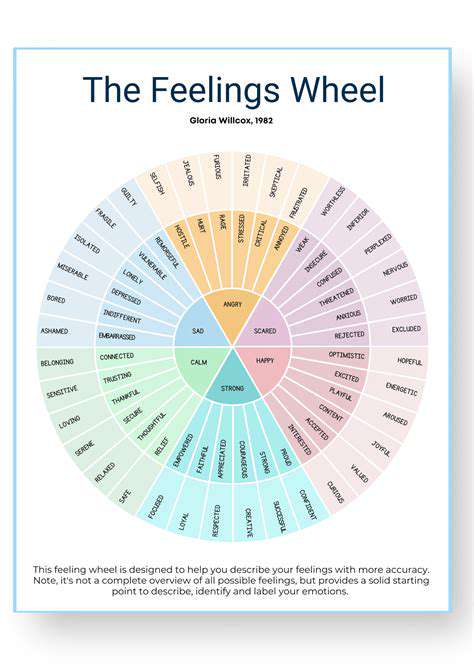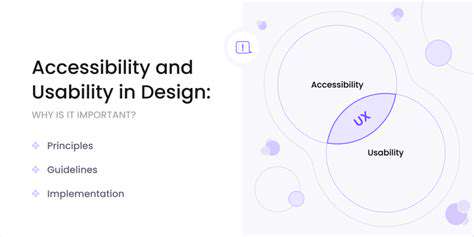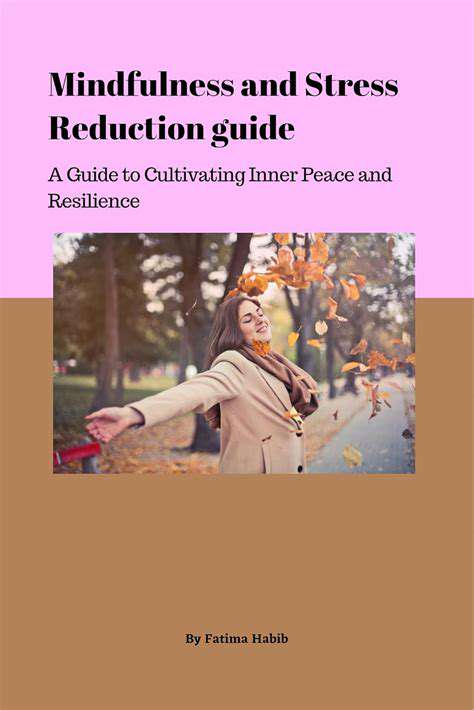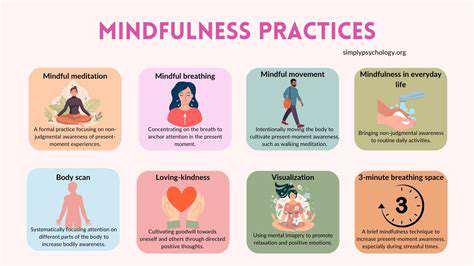Embracing Imperfection: The Path to Self Acceptance
Understanding Self-Compassion
When we stumble or face setbacks, treating ourselves with kindness becomes revolutionary. Self-compassion isn't weakness—it's the courageous act of extending to ourselves the same warmth we'd offer a struggling friend. This practice acknowledges that rough patches don't make us flawed, but human. Research shows this mindset shift reduces anxiety while boosting emotional resilience.
Identifying Self-Critical Patterns
That voice whispering you're not good enough often wears familiar disguises. Maybe it's the perfectionist demanding spotless work, or the comparer measuring us against others' highlight reels. These mental habits frequently originate from childhood experiences or cultural messages absorbed over years. Spotting them is like turning on a light in a dark room—suddenly we see what we're really dealing with.
Practicing Self-Kindness in Action
Small gestures build this skill: pausing to breathe when stressed, writing encouraging notes to future yourself, or scheduling guilt-free breaks. The magic happens when we replace I should be better with I'm learning. One client started keeping a progress jar—adding a note for each small win, then reading them during tough moments.
The Role of Acceptance in Self-Compassion
Acceptance functions like emotional WD-40—it reduces friction in our inner world. A therapist friend uses this analogy: You wouldn't yell at a sapling for not being a tree yet. Growth requires time and conditions, not shame. This perspective helps separate behaviors from identity—we can dislike an action without condemning our core self.
Developing a Compassionate Inner Dialogue
Language shapes reality, especially the words we direct inward. Try this reframing technique:
- Instead of I failed at this presentation → The presentation didn't go as planned—what can I learn?
- Rather than I'm terrible at relationships → Relationships challenge me in these specific ways...
Connecting with Others for Support
Vulnerability has a funny way of dissolving isolation. When one member of a writing group admitted her draft felt embarrassingly imperfect, others responded with relief, not judgment. Shared humanity thrives when masks come off. Consider joining communities where I'm struggling with... statements get met with Me too rather than advice.
Embracing Imperfection in Action: Practical Steps
Understanding the Concept of Imperfection
Japanese kintsugi offers a powerful metaphor—broken pottery repaired with gold lacquer becomes more valuable, not less. Similarly, our perceived flaws often become sources of unique strength when embraced authentically. The most inspiring leaders and creators aren't flawless—they're transparent about their ongoing growth.
Identifying Your Imperfections
Try this illuminating exercise: list three flaws that actually serve you. Maybe your distractibility fuels creative connections others miss. Perhaps stubbornness reflects valuable persistence. The line between weakness and strength often depends on context and framing. One executive discovered her overpreparing stemmed from childhood instability—now she channels it into thorough but time-bound research.
Reframing Your Mindset
Neuroscience reveals that labeling emotions (I feel anxious about this mistake) reduces their intensity by 50%. Add perspective-shifting questions:
- What would I tell my best friend in this situation?
- How might this look five years from now?
Practical Strategies for Implementing Imperfection
Design imperfection experiments:
- Send a work email with one typo left uncorrected (notice if the world ends)
- Share an unfinished creative project for feedback
- Practice saying I don't know in meetings
Setting Realistic Expectations
The 80/20 rule applies beautifully here—often 20% effort yields 80% results, while perfectionism demands 100% effort for those final 20%. Ask: What's good enough for this purpose? A graphic designer realized clients couldn't distinguish between her perfect and good enough drafts—freeing 10+ weekly hours.
Cultivating Self-Compassion
Create a self-compassion mantra for tough moments, like: This is hard, and it's okay that it's hard. I'm doing my best with what I have right now. Research confirms that self-compassion correlates more strongly with motivation than self-criticism does. It's the difference between a coach who yells and one who believes in you.
The Rewards of Letting Go of Perfectionism

Embracing Imperfection: A Path to Liberation
Consider the butterfly—if it refused to leave the cocoon until perfectly formed, it would never fly. Our most meaningful growth happens in the messy middle, not at some imaginary finish line. Clients who embrace this report feeling lighter, as if they've put down invisible weights carried for years.
Unveiling Inner Peace and Resilience
A study tracking perfectionists found they experienced 300% more daily stress than others. When they practiced accepting good enough, cortisol levels dropped significantly within weeks. Imperfection acceptance functions like an emotional shock absorber—we still hit bumps, but the ride becomes smoother.
Unlocking Creativity and Innovation
History's breakthroughs often emerged from happy accidents—penicillin, microwave ovens, even chocolate chip cookies. The creative process inherently involves missteps and redirections. One tech team instituted failure celebrations where the best mistake each week earned lunch for its maker—innovation skyrocketed as fear diminished.
Boosting Self-Esteem and Confidence
Authentic confidence grows from overcoming real challenges, not from maintaining perfect facades. Each time we survive an imperfect moment without crumbling, we deposit trust in ourselves. Like compound interest, these small acts accumulate into unshakable self-assurance.
Discovering Joy in the Journey
Perfectionism filters experiences through how could this be better? while imperfection acceptance asks what's wonderful right now? This subtle shift unlocks gratitude's transformative power. One recovering perfectionist began noticing sunset colors during commute delays—what was once frustration became daily awe.
Cultivating Gratitude and Appreciation
Imperfections make life textured and interesting—would we cherish handmade pottery if machines made it flawless? The cracks and quirks become stories and character. When we stop demanding perfection from ourselves, we start appreciating the imperfect beauty everywhere around us.
Read more about Embracing Imperfection: The Path to Self Acceptance
Hot Recommendations
- AI Driven Personalized Sleep Training for Chronic Insomnia
- AI Driven Personalization for Sustainable Stress Management
- Your Personalized Guide to Overcoming Limiting Beliefs
- Understanding Gender Dysphoria and Mental Health Support
- The Power of Advocacy: Mental Health Initiatives Reshaping Society
- Building a Personalized Self Compassion Practice for Self Worth
- The Ethics of AI in Mental Wellness: What You Need to Know
- AI Driven Insights into Your Unique Stress Triggers for Personalized Management
- Beyond Awareness: Actionable Mental Health Initiatives for Lasting Impact
- Creating a Personalized Sleep Hygiene Plan for Shift Workers
